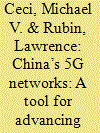| Srl | Item |
| 1 |
ID:
188129


|
|
|
|
|
| Summary/Abstract |
This article examines the claim that the People’s Republic of China (PRC) promotes its commercial interests in building 5G network infrastructure abroad to advance digital authoritarianism. Critics view China’s actions as part of a well-coordinated, strategic effort to promote authoritarian values, spread its version of authoritarianism, and shape global governance norms around information and communication technologies. However, concerns over China’s 5G infrastructure in supporting digital authoritarianism may be overstated. This essay finds that geopolitical dynamics and local economic considerations challenge China’s capacity to influence governance practices and questions the notion that China’s promotion of its 5G network infrastructure has a clear political, strategic intent. The findings suggest that the United States needs to refocus its messaging around the geopolitical and security risks associated with greater dependence on Chinese digital infrastructure as well as create new industrial policies to better compete economically in 5G.
|
|
|
|
|
|
|
|
|
|
|
|
|
|
|
|
| 2 |
ID:
189975


|
|
|
|
|
| Summary/Abstract |
This study has two research objectives. The first is to analyse a case of Chinese ‘cybernationalist authoritarianism’, which I define as the ideological articulation and practical conjoining of cybernationalism and digital authoritarianism. This intriguing case involves the peer production of a virtual celebrity called ‘Oppa China’ (阿中哥哥) by fangirls (饭圈女孩) in China. The empirical analysis contributes to ongoing debates on whether cybernationalists mainly serve or undermine authoritarianism in China. My second objective is to theoretically explore the rising phenomenon of cybernationalist authoritarianism. This exploration contributes to studies on the contemporary transformation of nationalism and authoritarianism. I approach the two objectives by analysing cybernationalist authoritarianism in terms of the interplay between cybernationalism and digital authoritarianism. I find that peer production is the key novel characteristic of cybernationalism and that authoritarian legitimation is the main imperative of digital authoritarianism. My analysis illustrates how the peer production of new and multiple cybernationalisms serves as well as undermines authoritarian legitimation. This study’s data include in-depth interviews, informal interviews, various documentary sources, big data from Weibo, and online participant observation.
|
|
|
|
|
|
|
|
|
|
|
|
|
|
|
|
| 3 |
ID:
194574


|
|
|
|
|
| Summary/Abstract |
The predicament of digital authoritarianism is particularly grievous for Africa because democratic institutions have been gradually eroded in several countries throughout the region. Illiberal regimes, in particular, exploit digital technologies to undermine such fragile democracies as Ethiopia, Tanzania, Uganda, and Zambia. Moreover, surveillance technology is expanding throughout the region as national and local governments seek to increase their capacity to monitor and control their populations—a trend that has been aggravated with the COVID-19 pandemic. This article assesses the risks posed by smart cities to democratic institutions and processes by identifying the main models of smart city development and how they conceive of the state and citizens’ relationship, then assessing how smart cities can potentially foster and consolidate digital authoritarianism, with a particular focus on the technology that a regime can exploit to pursue illiberal goals. I provide cases to illustrate how smart city systems promote digital authoritarianism and conclude by discussing proposals to mitigate the technological risks and promote democratic smart cities.
|
|
|
|
|
|
|
|
|
|
|
|
|
|
|
|